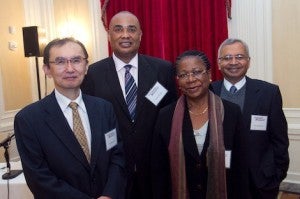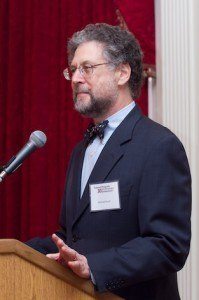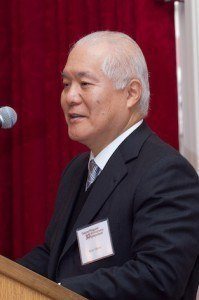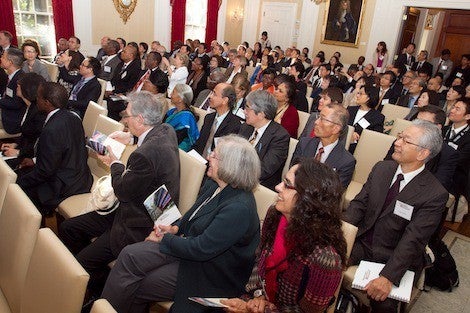October 30, 2013 — Over two decades ago, Uche Amazigo came to the Harvard School of Public Health (HSPH) from Nigeria to spend a year as a fellow in the Takemi Program in International Health. A university lecturer and biologist with training in public health and parasitology, with a specialty in tropical diseases, Amazigo had already conducted groundbreaking research on onchocerciasis, or river blindness—uncovering the social isolation, suffering, and disability caused by the disfigurement and unrelenting itching from the disease.
Amazigo says her experience as a Takemi Fellow—a year of learning, researching, and thinking about policy issues—helped focus her work and transformed her career, propelling her to a global leadership role in the control of onchocerciasis. Research she worked on as a Takemi Fellow helped spur the launch of the World Health Organization’s African Program for Onchocerciasis Control (WHO/APOC) in 1995. Amazigo joined WHO in 1996 and served as director of WHO/APOC from 2005-2011. During her time there, she helped expand onchocerciasis control programs in Africa from 11 to 19 countries and pioneered a path-breaking, community-driven strategy for treating the disease with ivermectin. For her work on onchocerciasis and her leadership at APOC, Amazigo received the prestigious Prince Mahidol Award for Public Health in 2012, a major achievement in global health.

“Having the opportunity to participate in the Takemi program was really a milestone in my career,” Amazigo said.
Amazigo reflected on her experience as a Takemi Fellow while taking part in the Takemi Program’s 30th anniversary symposium, held October 10-12, 2013. Convened in Cambridge at Harvard’s Loeb House and at HSPH, the event drew nearly 80 former and current Takemi Fellows.

Amazigo is one of many former Fellows who have gone on to leadership positions either in their own countries or in international organizations. “There is a network of Takemi Fellows that exists all around the world,” says [[Michael Reich]], Taro Takemi Professor of International Health Policy in the Department of Global Health and Population, who helped establish the program in 1983 and has directed the program since 1988.
Promoting health with smart strategies
The Takemi Program is focused on how best to mobilize, allocate, and manage scarce resources to improve health, and how to design effective strategies for disease control and prevention and health promotion—particularly in the world’s poorer countries. Each year the program draws a small group of Fellows from around the world. Since the program began there have been 242 Takemi Fellows from 51 countries.
The program, launched in 1983, was the brainchild of former HSPH Dean Howard Hiatt and the late Dr. Taro Takemi, who was president of the Japan Medical Association at the time. Both were concerned about the best ways to promote health and prevent disease, and decided to develop the Takemi Program as a way to bring together experts from a variety of fields—including medicine, public health, economics, law, and politics—to find effective and equitable solutions to the development and distribution of health care resources.
The Takemi Program is unique because it enables mid-career participants to “explore and do the work that they can’t do at home because they’re too busy,” Reich says. Fellows audit classes at Harvard, conduct their own research, attend weekly seminars, and learn from each other—with a lot of flexibility. The fellowship program “moves people from a small focused experience to the frontiers of knowledge and gives them the confidence to produce change in their own institutions and in their own lives,” Reich said.
The focus of the 30th anniversary symposium—on governing health systems at the community, national, and global levels—“is at the top of the global health policy agenda,” Reich said. Talks were presented on topics such as common challenges faced by community health workers in Zambia and Japan; reforming the United Nations health system for Palestine refugees; and global governance issues surrounding individual diseases such as malaria and tuberculosis.

The event also drew leaders in global health from around the world, including four HSPH deans (Hiatt, Harvey Fineberg, Barry Bloom, and Julio Frenk); Richard Horton, editor in-chief of The Lancet; Speciosa Wandira-Kasibwe, SD ’09, former vice president of Uganda and now United Nations Secretary-General Ban Ki-moon’s Special Envoy for HIV/AIDS in Africa; Yoshitake Yokokura, president of the Japan Medical Association; Lincoln Chen, president of the China Medical Board and former Takemi Professor of International Health; and Keizo Takemi, Taro’s son, a member of Japan’s House of Councillors and, according to Reich, Japan’s “leading voice” on global health.
Sharing knowledge, deepening understanding
Friday Okonofua, a program officer with the Ford Foundation in Nigeria and a reproductive health expert, was a Takemi Fellow in 1991-92. He said the program helped propel his career, leading him in 1993 to establish the Women’s Health and Action Research Centre, now one of Nigeria’s leading NGOs. He also served as executive director of the International Federation of Obstetricians and Gynecologists and as health adviser to Nigeria’s former President Olusegun Obasanjo, and he sits on the boards of several national and international NGOs and foundations.
“The Takemi Program provides opportunities for advocates at the frontline of social change in both low- and high-income countries to have a shared understanding of the nature of health inequities that exists in many parts of the world,” Okonofua said. “And it enables the sharing and exchange of skills, experiences, and contacts among academics and scientists.”
Bong-Min Yang, professor at Seoul National University’s School of Public Health and a leading Korean health economist, said that when he was a Takemi Fellow in 1989-90, “I realized that my eyes as a public health specialist were opening wide. The program helped me feel better informed and more competent, and provided a momentum that helped shape my thinking and my career direction.”
The comments from Yang, Okonofua, and Amazigo are typical of former Takemi Fellows, said Reich. “The phrase people commonly say about the program is, ‘It changed my life,’” he said. “From those personal changes in the Takemi Program, the Fellows go on to change the world. We could not ask for more.”
photos: Bethany Versoy
